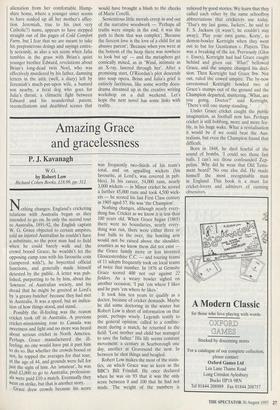Amazing Grace and gracelessness
P. J. Kavanagh W.G.
by Robert Low Richard Cohen Books, £18.99, pp. 312 Nothing changes: England's cricketing relations with Australia began as they intended to go on. In only the second tour to Australia, 1891-92, the English captain W. G. Grace objected to certain umpires, told an injured Australian he couldn't have a substitute, so the poor man had to field when he could barely walk and the crowd booed Grace; he wouldn't let the opposing camp toss with his favourite coin (tampered with?), he boycotted official functions, and generally made himself detested by the public. A letter was pub- lished, purporting to be by him, about the `lowness' of Australian society, and his dread that he might be greeted at Lord's by 'a greasy butcher' because they had met in Australia. It was a spoof, but an indica- tion of how things stood, and stand.
Possibly the ill-feeling was the reason cricket took off in Australia. A previous cricket-missionising tour to Canada was sweetness and light and no more was heard about serious cricket in North America. Perhaps Grace manufactured the ill- feeling; no one would have put it past him to do so. But whether the crowds booed or not, he topped the averages for that tour, at the age of 44, and grounds were full for just the sight of him. An 'amateur', he was paid £3,000 to go to Australia; profession- als were paid £10 a match. Eventually they went on strike, but that is another story. Grace drew crowds because his score was frequently two-thirds of his team's total, and on appalling wickets (his favourite, at Lord's, was covered in peb- bles). In his career, 54,000 runs, nearly 3,000 wickets — in Minor cricket he scored a further 45,000 runs and took 4,500 wick- ets — he scored his last First Class century in 1905 aged 57. He was 'the Champion'. Nothing changes, although nearly every- thing has. Cricket as we know it is less than 100 years old. When Grace began (1865) there were no boundaries, nearly every- thing was run, there were either three or four balls to the over, the bowling arm would not be raised above the shoulder, counties as we know them did not exist the Grace family more or less invented Gloucestershire C.C. — and touring teams of 11 adepts frequently took on local teams of twice that number. In 1876 at Grimsby Grace scored 400 not out against 22 fielders. As a weary bowler sighed on another occasion, 'I put 'em where I likes and he puts 'em where he likes.'
It took him ten years to qualify as a doctor, because of cricket demands. Maybe he did some doctoring in the winter but Robert Low is short of information on that point, perhaps wisely. Legends testify to the general opinion; called to a confine- ment during a match, he returned to the field: 'Lost mother and child but managed to save the father.' His life seems constant movement: a century in Scarborough one day, another at Gravesend the next. In between he shot things and beagled.
Robert Low makes the most of the statis- tics, on which Grace was as keen as the BBC's Bill Frindall. He once declared when he was on 93 that it was the only score between 0 and 100 that he had not made. The weight of the numbers is relieved by good stories. We learn that they called each other by the same schoolboy abbreviations that cricketers use today. `That's my last game, Jackers', he said to F. S. Jackson (it wasn't; he couldn't stay away); 'Play your own game, Korty', to demon-bowler Kortright when they went out to bat for Gentlemen v. Players. This was a breaking of the ice. Previously (Glos v. Essex), Kortright had had Grace caught behind and given out. 'What!' bellowed Grace, and the umpire changed his deci- sion. Then Kortright had Grace lbw. Not out, ruled the cowed umpire. The by-now envenomed Kortright bowled two of Grace's stumps out of the ground and the Champion departed, muttering. 'What, are you going, Doctor?' said Kortright. `There's still one stump standing. '
Under Grace cricket caught the public imagination, as football now has. Perhaps cricket is still bobbing, more and more fee- bly, in his huge wake. What a revitalisation it would be if we could beat the Aus- tralians, but even the Champion found that difficult.
Born in 1848, he died fearful of the sound of bombs. 'I could see those fast balls. I can't see those confounded Zep- pelins.' Why did he wear that Old Testa- ment beard? No one else did. He made himself the most recognisable man in England. This book is a must for cricket-lovers and admirers of cunning obsessives.


















































 Previous page
Previous page